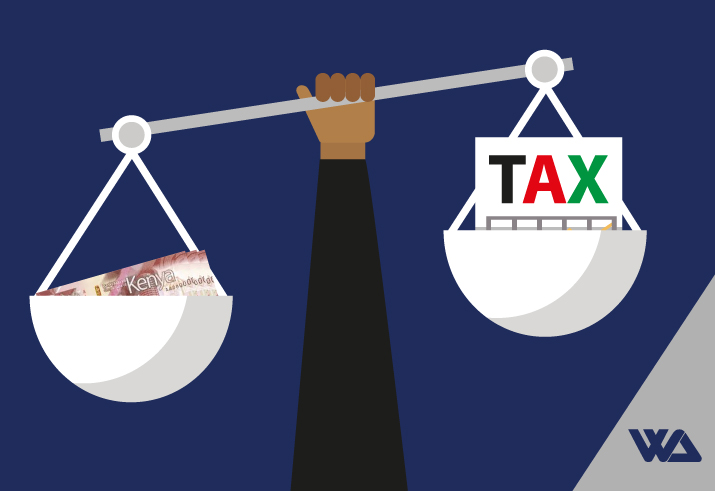On 13th June 2019, the Cabinet Secretary for Finance while delivering the proposed budget spending for the year 2019-2020 tabled the Finance Bill 2019. The bill seeks to amend the law relating to various taxes and duties and for matters incidental thereto. The Bill was passed by the National Assembly and presented to the President for assent. However, the President did not assent to the Bill and returned the Bill to the National Assembly with a Memorandum on the issue of interest capping rates.
This paper seeks to highlight some of the salient features of the bill, in particulars the amendments made to taxation laws.
a) Taxation on the digital economy.
The Bill proposes the amendment of Section 3 of the Income Tax Act to introduce the following new paragraph:
“Income chargeable to tax includes income accruing through a digital market place”
The term “digital marketplace” has been defined as a platform that enables direct interaction between buyers and sellers of goods and services through electronic means.
b) Value Added Tax (VAT).
The Bill proposes to amend Section 42A of the Tax Procedures Act by reducing the withholding VAT rate from 6% to 2%. This change will affect all taxpayers who make taxable supplies to customers who have been appointed as withholding VAT agents. Supplies that are made through digital platforms are also chargeable to VAT.
The Bill further proposes to amend Section 2 of the Value Added Tax Act by changing the definition of “supply of imported services” by deleting the words “a person who is a registered person” and substituting the words with “any persons”. The effect of this amendment is to widen the scope to include all taxable services received from non-resident persons whether the recipient is registered for VAT or not. It would be interesting to note how revenue will be collected from persons who are not VAT registered and also how the amendment would work in light of the current reverse-charge mechanism of VAT on imported services provided under Section 10 of the Value Added Tax Act.
c) Withholding Tax.
The Bill proposes to widen the scope of services subject to withholding tax by amending Section 10 of the Income Tax Act to include: security services, cleaning and fumigation services, catering services offered outside the hotel premises, marketing and advertisement services, transportation of goods excluding air transport services, and sales promotion. Withholding tax is usually that portion of income tax that is deducted from salary, wages, dividends, or other income before the earner receives payment.
The above-mentioned services will attract withholding tax at the resident and non-resident rates of 5% and 20% rates respectively.
The Bill also proposes to amend Section 2 of the Income Tax Act by deleting the definition of demurrage charges. The Bill proposes the repeal of the provision relating to withholding tax payable on demurrage charges to non- resident ship operators. The provision was introduced last year through the Finance Bill 2018. The proposed amendment will be welcome to non- resident shipping lines.
d) Capital Gains Tax.
The Bill proposed to amend Section 34 (j) of the Income Tax Act by increasing the rate of Capital Gains Tax from 5 % to 12.5 %. Capital Gains Tax was re-introduced in 2015 and the rate of 5% prescribed on transferors of property. However, the National Assembly rejected the proposal to increase the levy and retained the current 5%. In rejecting the proposal, Parliament stated that the amendment would hurt the government’s housing agenda.
The Bill also proposed the amendment of the Eighth Schedule to the Income Tax Act by proposing an exemption of Capital Gains Tax in cases of transfer of property necessitated by transactions involving the incorporation, recapitalization, acquisition, amalgamation, separation, dissolution or similar restructuring of a corporate entity where such restructuring is:
- (i) a legal or regulatory requirement;
- (ii) as a result of a directive or compulsory acquisition by the government;
- (iii) an internal restructuring within a group which does not involve transfer of property to a third party; or
- (iv) In the public interest and approved by the Cabinet Secretary
e) Personal Income Tax.
- Turnover tax and Pre-emptive Tax.
The proposed bill seeks to amend Section 12(c) of the Income Tax Act and replacing the same by introducing a provision on turnover and presumptive tax. The turnover tax shall be payable by any resident person whose turnover from business does not exceed or is not expected to exceed five million shillings during any year of income. The tax shall not be applicable to rental income, management or professional or training fees, the income of incorporated companies, any income, which is subject to a final withholding tax under the Act.
The proposed amendments also provide that a person required to pay turnover tax, shall be liable to pay presumptive tax equal to fifteen percent of the amount payable for a business permit or trading license issued by a county government, which shall be offset against the turnover tax payable. This proposed amendment will increase tax revenue by ensuring that persons in the informal business sector are subjected to tax.
- Individuals registered under Ajira Digital Program.
The Bill proposed to amend the First Schedule to the Income Tax Act Part I by exempting individuals registered under the Ajira Digital Program for three years beginning 1st January 2020. The Ajira digital programme is a Government initiative launched by the Ministry of Information, Communications and Technology (ICT) that is geared to creating employment opportunities for the youth through online jobs. Persons who wish to be enrolled in the programme are required to pay KES 10,000.00 per annum.
- Exception of Income from the National Housing Development Fund (NHDF)
The Bill proposes the amendment of the First Schedule to the Income Tax Act by adding the exemption of income from the National Housing Development Fund. The Government had issued a directive that employers will be required to deduct 1.5 percent of an employee’s salary towards the National Housing Fund. The directive is currently under challenge in court where interim orders were issued stopping the implementation of the directive.
f) Excise Duty
- Introduction of Excise duty on betting activities.
In an effort to regulate the betting industry, which has been on a meteoric rise and accused of having negative social effects particularly on the youth, the Bill proposes to amend the First Schedule of the Excise Duty Act by introducing ten percent excise duty of the amount wagered or staked. The tax liability will arise at the time when the bet is placed.
- Excise duty on Motor Vehicles.
The Bill proposes to amend the First Schedule to the Excise Duty Act by increasing excise duty on motor vehicles of cylinder capacity exceeding 1500cc from 20% to 25% and on the other hand reducing excise duty on 100% electric powered motor vehicles from 20% to 10%. The amendments are aimed at promoting the use of environment friendly motor vehicles.
- Excise Duty on Plastic Shopping Bags.
The Government banned the use of plastic shopping bags and therefore the proposal to remove the excise duty on plastic bags is in line with the Government’s ban on the plastic bags.
g) Exemption of KRA PIN requirement for certain transactions.
The Bill proposes to amend Section 12 of the Tax Procedures Act empowering the Commissioner to grant an exemption from the requirement to provide a PIN for any of the transactions specified in the First Schedule of the Act.
h) Interest rate cap under Section 33 B of the Banking Act to be repealed.
The High Court in Boniface Oduor vs. Attorney General & another; Kenya Banker’s Association & 2 others (Interested Parties) [2019] eKLR declared Section 33 B of the Banking Act unconstitutional, null and void for being vague, ambiguous, imprecise and indefinite. The Bill proposes to actualize the decision into law by having the said provision repealed.
The repeal of the section may improve access to facilities to Small and Medium-sized Enterprises (SMEs). Lenders previously opted to issue facilities to the Government as it posed a lesser risk. The cost of borrowing might increase if the industry is not properly regulated. Though the proposed amendment was defeated in parliament during the Committee stage, when the Finance Bill was presented to the President for assent, he returned the Bill back to the Parliament with a Memorandum to the effect that Parliament ought not to have deleted the proposed legislation for the reasons that interest cap had slowed down the economy. The National Assembly have thus a doubting task to marshal 2/3 majority to veto the Memorandum by the President failure of which, the terms of the original bill on interest rate will become law with the effect that interest rates will be determined by market forces of demand and supply.
i) Anti- money laundering obligation extended to advocates.
The Bill proposes to amend Section 2 of the Proceeds of Crime and Anti-Money Laundering Act, 2009 by including advocates, notaries and other independent legal professionals who are sole practitioners, partners or employees within professional firms to the definition of “designated non-financial businesses and professions.
It will be interesting to note how this will be implemented in light of the principle of advocate- client privilege and the duty of confidentiality that is key to the legal profession.
j) Financial Penalties under the Capital Markets Authority to be recovered as civil debts.
The Bill proposes to amend Section 11 of the Capital Markets Act to include the phrase:
“Provided that the financial penalties shall be recoverable summarily by the Authority as civil debts”
The proposed amendment will enable the authority to effectively discharge its mandate under the Act. This will mean that a suit will be instituted in a court of competent jurisdiction and judgment entered for the sum penalized by the Authority.
Conclusion
The above are some but not all of the key highlights of the Finance Bill 2019 . The proposed legislation is aimed at enabling the government achieve its revenue targets as well as implement its polices. However as noted earlier, the Bill was not assented to by the President who returned the Bill to the National Assembly with a Memorandum on interest-rate capping legislation. The general public is thus waiting to see whether the National Assembly will marshal 2/3 majority to overrun the President’s Memorandum on not.












